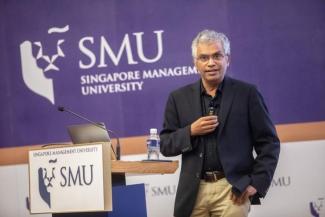
“Trust is a long term concept based on multiple interactions. While I don’t have a theory on how to engender trust, doing inexplicable things and providing full explanations will help get humans to trust AI systems,” said Subbarao Kambhampati, Professor of Computer Science at Arizona State University, at the Presidential Distinguished Lecturer Series on 2 April 2019 where he spoke on the topic “Rise of AI and The Challenges of Human-Aware AI Systems”
Prof Kambhampati was the President of the Association for the Advancement of Artificial Intelligence (or AAAI) from 2016 to 2018, and a Trustee of the International Joint Conferences on Artificial Intelligence from 2013 to 2018. Professor Kambhampati was a recipient of the National Science Foundation Research Initiation Award, the National Science Foundation Young Investigator Award, the IBM Faculty Award and multiple Google Research Awards. He is currently a fellow of AAAI and AAAS (American Association for the Advancement of Science).
Addressing about 200 SMU students, staff and faculty, Junior College students and teachers, as well as government and industry representatives, Prof Kambhampati shared that human babies progressively developed the different forms of intelligence – from Perceptual & Manipulation intelligence, which includes image recognition and hand-eye coordination; to Emotional Intelligence, which involves showing and recognising emotional responses; to Social Intelligence and finally Cognitive Intelligence.
However, the development of AI systems progressed from the opposite direction, starting with Cognitive Intelligence, and only recently starting to delve into Perceptual Intelligence. This is because it is easier to programme computers and aspects of intelligence for which humans have conscious theories. “We know, for example, what is involved in playing chess or running a company, but we do not have consciously accessible theory for things such as image and speech recognition. Hence AI systems would have to learn from data. Learning from data demonstrations have to occur in order for Perceptual Intelligence to happen,” said Prof Kambhampati.


Prof Kambhampati said that computers are able to outperform humans in narrow specialised tasks; however, in terms of the general intelligence and ability to do multiple tasks, there are many thresholds which AI systems would have to cross. For example, AI systems do not possess ‘common sense’ which humans have, and they are only able to acquire their intelligence after learning from a large number of examples rather than from a few examples, unlike humans.
In the development of human-aware AI systems which come with social and emotional intelligence, Prof Kambhampati noted that “putting humans in the loop in AI systems make the problems harder, but it’s worthwhile because we want this technology to work with us by designing a future where AI systems and humans work together.”
Prof Kambhampati also raised the issue of data bias, which is tacit knowledge learned by AI systems from data that is not representative. He felt that data bias is not an easy problem to fix, and highlighted the importance of providing unbiased data sets. He also spoke about the negative side of AI, such as fake reality which makes it difficult to differentiate between real and unreal, biased systems manipulation, and the loss of jobs.
Ending his speech on a positive note, Prof Kambhampati said the future is great with AI technology as it could help humans improve our quality of life and create social good. “I still find there is a lot of hope in using AI, you just have to be careful how you use it,” he said.


In a lively Question and Answer session moderated by SMU President Professor Lily Kong, Prof Kambhampati fielded numerous questions from an enthusiastic audience, including whether AI systems need to have emotions in order to have emotional intelligence and if that is possible and the impact AI has on human intelligence. To the question on the race for AI supremacy between USA and China, Prof Kambhampati noted that the number of AI research papers and citations from China have been increasing. He felt that AI research is not a zero-sum game, and viewed China’s investment in furthering AI technology as a positive development.